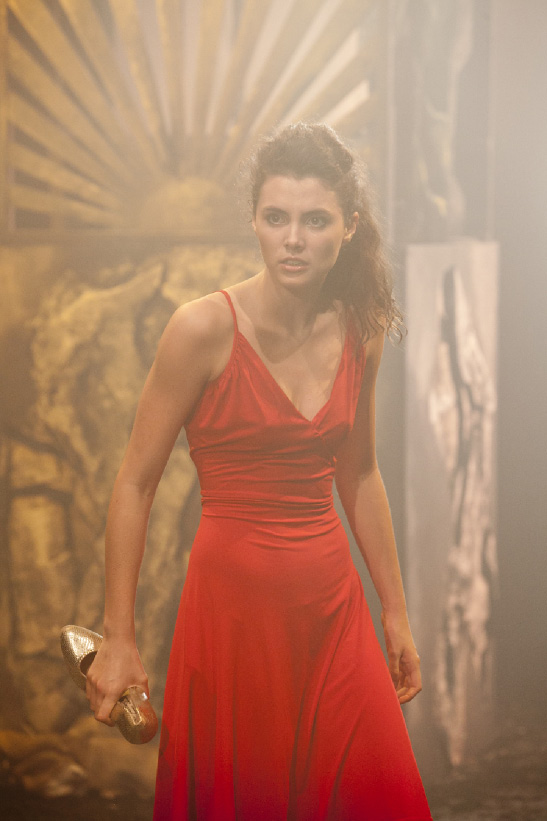Bucking the trend… or perhaps at the forefront of a new one, Fourth Monkey are now offering an intensive two-year actor training course.
When formed back in 2010, Fourth Monkey were looking to challenge what was perceived to be at the time and still in many circles today the tried, tested and only means of training actors in the UK. With decades, even centuries of influence from other countries and cultures the UK training scene has seemingly shifted very little since it’s conception, the established and undoubtedly successful schools still delivering training founded in a lot of the same principles they have done so for years.
This one would assume is because it is a system that is tried and tested and works for all, but perhaps this is not the case and this is where they felt a new school, with a new outlook on the demands and requirements of contemporary actor training was overdue, challenging an industry stuck in a rut of comfortable tradition, not to mention exclusive and mystified philosophies.
Fourth Monkey was born with a simple mission – to challenge the status quo and offer an alternative, perhaps even revolutionary, actor training in the UK. Inspired by work in France, Poland and the Far East they began to compose an accelerated training pedagogy to rival some of the celebrated schools in those parts of the world.
Having taught and worked in many institutions previously in the UK and overseas, the core team at Fourth Monkey interrogated what they felt worked, where the holes where if any and what could be done differently to offer a new perspective. The first obvious question was; do actors have to train for three years?
The resounding answer was no, they don’t.
However, what if you could genuinely offer comparable or even superior training in a shorter time-frame than three years?
How many hours do they do in three years anyway? Well at University of course, we tend to expect 12-16 hours contact time a week if we are lucky across three terms and at Drama school between 30-40 depending on the school, its philosophy and resources. The notable part of this equation however are the terms of study, three terms often short, especially in the summer term and in year three with a lot of holidays scattered throughout the year. Surely this was a loophole that could be closed.
The truth is that on a majority of three-year actor training courses the student will undertake approximately 3000 hours of supported study as part of their training. This is the marker set by a number of the accrediting bodies and is seen as a standardised amount of contact for drama schools offering three years of training. Fourth Monkey offer 3190 in two years, as a point of reference, across two years and 8 terms instead of 9.
Most courses are taking three years’ worth of fees, whilst students are subjected to three years’ worth of living expenses. Many students will come out of this process with debt or expenditure exceeding £50,000. Surely a significant stumbling block for a significant proportion of our society and undoubtedly a contributing factor to the exclusive white middle-class predominance of the student body.
Looking for another way… it may not be for everyone and that is fine too, as £50,000 worth of debt isn’t either, but believing passionately that the arts should be for all and that includes those who cannot necessarily afford the scale of debt most drama school graduates encounter.
What about the learning though, is there any benefit to the training lasting three years? No, no paper, study or anything similar concludes that three years are necessary for an actor in training to become a professional in waiting, especially if the recommended contact hours are being met. One of the main contributing factors to an actor’s development is in fact, as testified and well documented by luminaries such as Sir Derek Jacobi and Dame Judi Dench amongst others, that the learning accelerates through the practice of the craft. Therefore, in essence, the longer you spend locked away in a black box making noises and shapes the less productive and developmental it is to the actor’s study and progress. The actor in waiting needs to be out there practicing their craft much like a footballer needs ‘game-time’ so does an actor. There is no rocket science here, is it mere logic.
Training for two years not solely makes it more affordable, but also offers an intensive, demanding and accelerated actor training programme that in itself, by definition prepares you for the intensity of the industry and balancing life, love, bills and all else the world brings upon graduation.
Over two years Fourth Monkey are offering the same, and in many instances more contact hours than on a number of three year courses; their alumni are retaining within the industry at a rate far greater than a number of their competitors, with an industry retention rate of 93% and graduate employment figures year on year in excess of 90%.
It would appear to be doing something that both works and costs less. So why don’t all colleges rip up their timetables and convert to two-year training programmes? If you can do it in two years, why then do it in three? It could be tradition, it could be financial, it could be philosophy, it could be a million and one things. But is it odd that they are almost alone in this two year zone?
Perhaps it is because the two-year course is yet to be accredited – not wishing to compromise its identity, as they see it. Possibly. The accreditation ‘club’ currently favouring the three-year courses, not yet able or prepared to compare like with something other than like. Perhaps they will in time and the accreditation bodies are starting to listen too, but change is painfully slow and all the while more and more prospective talent is turned away from this industry due to its exclusivity or sheer expense.
We don’t all have to be the same to be successful or indeed to offer this industry what it needs. In fact, the industry benefits far greater when we don’t.
And here is the question, what does the industry need? It needs change, different actors, creatives, those from different parts of our society, with different skin tones, different genders, those who think differently; and maybe, just maybe by offering an affordable two-year option that is progressing alumni after alumni into the same professional echelons as those graduating from three year programmes is one possible means of achieving genuine change in this industry we are all so passionate about.
This could just be the future. Maybe it’s time to see things through a different lens, for the benefit of the industry as a whole and the generations of young people who see it as inaccessible and unaffordable. The arts are for everyone we are constantly told, let’s do more to make it so.
***Fourth Monkey is a registered charity and training provider and its students have access to the professional career development loan to support their training and study. More details are available via www.fourthmonkey.co.uk



